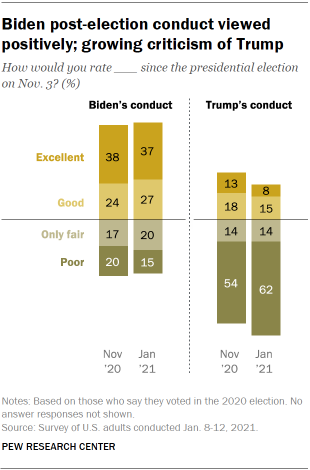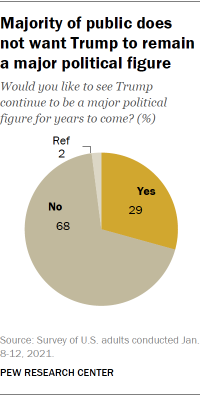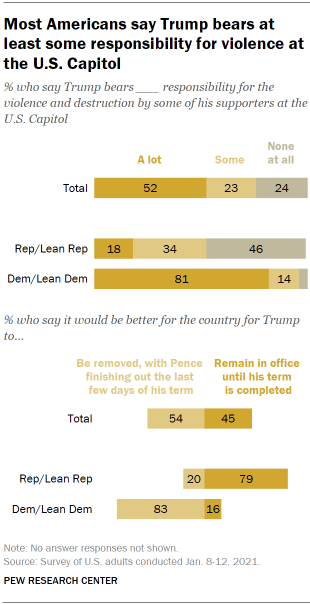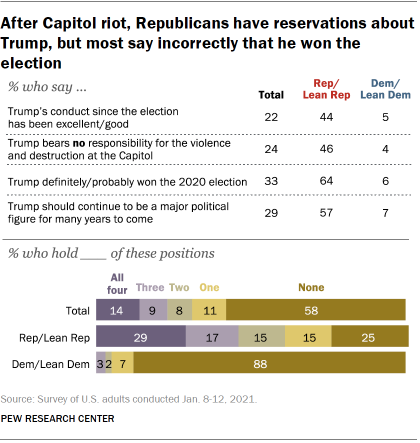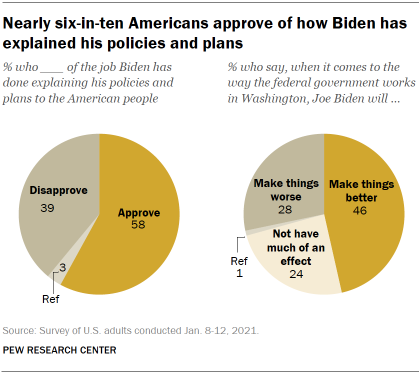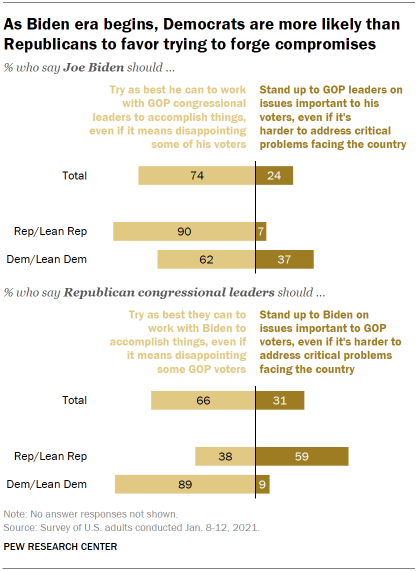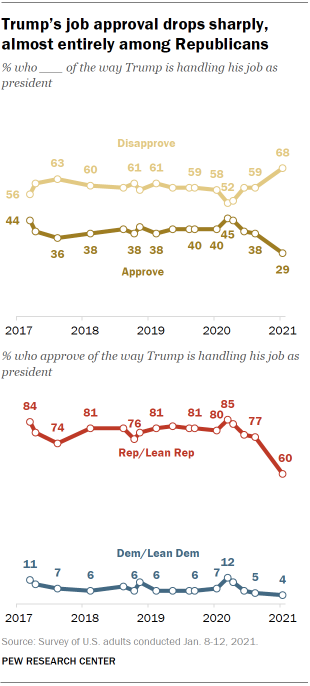68% of public does not want Trump to remain a major political figure in the future
Pew Research Center conducted this study to examine the public’s reactions to the aftermath of the 2020 presidential election, including a look into Americans’ views of Joe Biden as the president-elect and thoughts about the insurrection that took place at the Capitol earlier this month. For this analysis, we surveyed 5,360 U.S. adults in January 2021. Everyone who took part in this survey is a member of Pew Research Center’s American Trends Panel (ATP), an online survey panel that is recruited through national, random sampling of residential addresses. This way nearly all U.S. adults have a chance of selection. The survey is weighted to be representative of the U.S. adult population by gender, race, ethnicity, partisan affiliation, education and other categories. Read more about the ATP’s methodology.
Here are the questions used for the report, along with responses, and its methodology.
As Joe Biden prepares to take office just days after a deadly riot inside the U.S. Capitol, 64% of voters express a positive opinion of his conduct since he won the November election. Majorities also approve of Biden’s Cabinet selections and how he has explained his plans and policies for the future.
Donald Trump is leaving the White House with the lowest job approval of his presidency (29%) and increasingly negative ratings for his post-election conduct. The share of voters who rate Trump’s conduct since the election as only fair or poor has risen from 68% in November to 76%, with virtually all of the increase coming in his “poor” ratings (62% now, 54% then).
Trump voters, in particular, have grown more critical of their candidate’s post-election conduct. The share of his supporters who describe his conduct as poor has doubled over the past two months, from 10% to 20%.
The new survey by Pew Research Center, conducted Jan. 8-12 among 5,360 U.S. adults, including 4,040 who say they voted in the presidential election, finds that a sizable majority of Americans do not want Trump to remain a major political figure after he leaves office. About two-thirds (68%) say Trump should not continue to be a major national political figure for many years to come; just 29% say he should remain a major figure in U.S. politics.
For many, the shocking events of Jan. 6 – when some Trump supporters heeded the president’s call to march to the Capitol to protest Congress’ acceptance of Biden’s victory and then went on a violent rampage throughout the building – have seriously marred Trump’s final days as president.
Three-quarters of the public say the president bears at least some responsibility for the violence and destruction committed by some of his supporters, with 52% saying he bears a lot of responsibility for their actions. Just about a quarter (24%) say Trump has no responsibility for what took place.
The House voted Jan. 13 to impeach Trump for a second time, charging the president with “inciting violence against the government of the United States.” A narrow majority of Americans (54%) say it would be better for the country for Trump to be removed from office, with Vice President Mike Pence finishing the last few days of his term, while 45% say Trump should remain in office until his term ends Jan. 20.
As has been the case throughout Trump’s four years as president, Republicans and Democrats remain deeply divided – in this case, over Trump’s culpability in the unprecedented assault on the Capitol and whether he should be removed from office in the final days of his presidency.
Only about half of Republicans and Republican-leaning independents (52%) say Trump bears any responsibility for the violence and destruction in the Capitol and 79% do not think he should be removed from office before Jan. 20. Virtually all Democrats and Democratic leaners (95%) say Trump bears at least some responsibility for the riot– and 83% favor his removal as president.
These deep divisions extend to opinions about the election result itself. Biden will be inaugurated Jan. 20 with a large segment of Trump voters viewing Trump as the winner of the election, despite scores of failed court challenges to the election brought by Trump’s lawyers and Congress’ confirmation of Biden’s Electoral College victory in the early morning hours of Jan. 7.
Among voters overall, 65% say Biden definitely or probably “received the most votes cast by eligible voters in enough states to win the election”; 54% say he definitely won the most votes. But 34% incorrectly say Trump definitely or probably was the rightful election winner.
The survey provides new insights into how Republicans and Republican leaners – a broader group than just Trump voters – view the president as he prepares to exit the White House. Democrats continue to be uniformly critical of Trump.
Republicans have mixed views of Trump’s post-election conduct and his responsibility for the violent events of Jan. 6; fewer than half (46%) say he bears no responsibility for the Capitol riot.
However, a 64% majority agrees with his contention – disproved in numerous court decisions and rejected by Congress itself – that he is the rightful winner of the election.
When the responses to four measures on Trump and his future are combined, GOP internal divisions emerge: 29% hold all four positions – that is, they endorse Trump’s post-election conduct, hold him blameless for the riot, believe he is the election’s rightful winner and want him to have a major role in politics going forward. However, nearly as many Republicans – 25% – hold none of these views. And nearly half of Republicans (46%) hold some combination of these positions, agreeing with some but not others.
Biden enters office on a positive note
Biden will take office Jan. 20 with relatively strong performance ratings: The new survey, conducted on Pew Research Center’s nationally representative online American Trends Panel, finds that 58% of Americans approve of the job Biden has done in explaining his plans and policies. In a January 2017 telephone survey, a smaller share (39%) approved of how Trump had explained his plans for the presidency; in an early 2009 phone survey, Barack Obama had a 70% approval rating on the same measure.
A nearly identical majority of Americans – 57% – approve of Biden’s Cabinet choices and other high-level appointments. Almost half (46%) expect Biden to improve the way the federal government in Washington, D.C., works, while 28% say he will make things worse; 24% say he will not have much of an effect.
With the Democratic Party winning the White House and narrow control of the Senate, while retaining a House majority, Democrats broadly endorse efforts by Biden to forge bipartisan compromises with Republicans. Republicans, by contrast, are far more reluctant to see their party’s congressional leaders work with Biden.
About six-in-ten Democrats (62%) say Biden should try to work with Republican leaders “even it means disappointing some of his voters.” Far fewer (37%) want Biden to “stand up” to Republicans even if it’s harder to address critical issues.
Among Democrats, conservatives and moderates (69%) are more likely than liberals (55%) to favor Biden working with Republicans.
A majority of Republicans (59%) want their party’s leaders to “stand up” to Biden; 38% say they should try to work with Biden even if means disappointing some GOP voters. A sizable majority of conservative Republicans (69%) favor GOP leaders standing up to Biden, compared with 44% of GOP moderates and liberals.
Other major findings from the survey
Opposition to Trump, increased mail and early voting widely viewed as major reasons for election result. Two-thirds of voters (67%) say a major reason for the election result was that “many voters were excited to vote against Trump”; majorities also cite the increased availability of mail and early voting (59%) and the Trump administration’s failure to do a good job in handling the coronavirus outbreak (55%). Only 32% cite widespread illegal voting and fraud; 70% of Trump voters cite this as a major reason for the election result, compared with just 2% of Biden voters.
Most think election cheating occurs often or sometimes. About eight-in-ten Americans say political candidates and campaigns often (36%) or sometimes (43%) do illegal things to ensure they have the best chance of winning. Of those who say such activities occur (even very rarely), 46% say they are done about equally by both parties; 27% say such actions are committed more often by Democrats and 26% more often by Republicans.
Trump job approval has fallen sharply since August. Throughout most of his presidency, Trump’s job rating remained more stable than those of his predecessors; it never surpassed 45% or dipped below 36%. But his job approval now stands at just 29%, down 9 percentage points since August and the lowest of his presidency. Much of the decline has come among Republicans and GOP leaners: Currently, 60% approve of his job performance; 77% approved in August.
Americans split in their views of Kamala Harris. Harris will make history on Jan. 20 by becoming the nation’s first woman vice president and first Black American and first Asian American to assume this role. Half of Americans say the vice president-elect is qualified to serve as president, while nearly as many say she is not. A majority of the public (55%) expects her to have about the right amount of influence in the Biden administration; 36% say she will have too much influence, while 7% say she will have too little influence.


